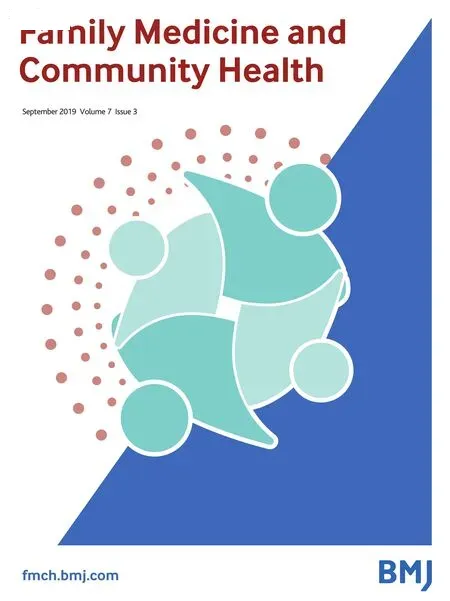Transforming a medical curriculum development into an education research
To the editor
As family medicine educators and researchers in China, it was with a great anticipation we read the article of curriculum development framework by Jill Schneiderhan and Dobson.1Because education of future general practitioner in China has become increasingly important,this paper is timely and instructive. However, an elaborate curriculum development isn’t sufficient to become an education research. We hope to raise some concerns for the education researchers regarding the methodological aspects while developing a curriculum.
It seems that some authors view education research as a ‘soft’science, therefore conducting the research without adequate rigour and precision. A systematic review2of experimental studies in medical education demonstrated generally poor quality with inexplicit study design statement, lack of comparison group and institutional review board approval. Another scoping review3of education researches in family medicine also highlights an overall need for increased sophistication in methodological approaches; 23% of the quantitative studies used pretests/post-tests,nearly half employed surveys as their primary method of data collection and only 10% used a randomised controlled trial. Taking the ubiquitous single-group pretests/posttests designs as an example, pretest will influence performance on an identical post-test through familiarity with the questions. Likewise,without a concurrent control group,positive result of such educational experiment doesn’t signify the effectiveness of novel education intervention, as people spend time learning,they will receive higher scores on the post-training test. It also cannot justify the effectiveness compared with other existing teachings, therefore does little to inform educational practice. Such design is susceptible to numerous validity threats and has limited generalisability and application.4Cook and Beckman4also summarised other important yet often neglected issues in designing educational research.
As the field of medical education in family practice grows dramatically and the evolution from opinion-based teaching to evidence-based teaching, research in medical education matters with the premise of rigorous methodology.5The perspective of education research should be changed from ‘soft’ to ‘hard’ science.We suggest the novice to follow the five steps proposed by William Ventres6to start your education research, carefully design your investigation by obeying the evaluating guidelines7from British Medical Journal or appraise your methodological quality by applying some valid scales, such as the Medical Education Research Study Quality Instrument.8It would also be beneficial for the first-time researchers to attend some programmes that designed to build capacity for medical education research.9Another convenient method could be the better engagement of methodologists throughout the research process.
Methodological aspects should be embedded in medical curriculum development with the simultaneous purpose of conducting education research. Paying more attention to methodology will bring better quality and combination of art and science in medical education.
Chuan Zou,1Xiaoyang Liao2
1Department of General Medicine, Chengdu Fifth People's Hospital, Chengdu, China
2Department of General Medicine, Sichuan University West China Hospital, Chengdu, China
Correspondence toProfessor Xiaoyang Liao;liaoxiaoyang@ sohu. com
Competing interestsNone declared.
Patient consent for publicationNot required.
Provenance and peer reviewNot commissioned;internally peer reviewed.
Open accessThis is an open access article distributed in accordance with the Creative Commons Attribution Non Commercial (CC BY-NC 4.0) license,which permits others to distribute, remix, adapt, build upon this work non-commercially, and license their derivative works on different terms, provided the original work is properly cited, appropriate credit is given, any changes made indicated, and the use is non-commercial. See: http:// creativecommons. org/licenses/ by- nc/ 4. 0/.
© Author(s) (or their employer(s)) 2019. Re-use permitted under CC BY-NC. No commercial re-use. See rights and permissions. Published by BMJ.

To citeZou C, Liao X. Fam Med Com Health 2019;7:e000214.
Received 30 July 2019
Accepted 31 July 2019
Published Online First 28 September 2019

►https:// doi. org/ 10. 1136/ fmch- 2019- 000219
Fam Med Com Health 2019;7:e000214.
doi:10.1136/fmch-2019-000214
ORCID iDChuan Zou http:// orcid. org/ 0000- 0001- 5094- 3486
 Family Medicine and Community Health2019年3期
Family Medicine and Community Health2019年3期
- Family Medicine and Community Health的其它文章
- Response to letter by Zhijie Xu: Why should mixed methods matter to primary care physicians a n d other providers?
- Response to letter by Lingping Zhu: Small ‘r’research as big ‘R’research in general practice
- Response to letters by M.Jawad Hashim and Chuan Zou: Advancing curriculum development and medical education research
- Female-to-male sexual transmssion of Zika virus infection
- The potential contribution of mixed methods research to primary care
- Some comments on general research methodology
